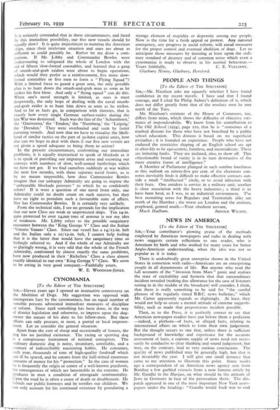PEOPLE AND THINGS [To the Editor of THE SPECTATOR]
Sta,—Mr. Nicolson asks me squarely whether I have found confidence in my recent travels. I have said that I found courage, and I cited Sir Philip Sidney's definition of it, which does not differ greatly from that of the resolute men he met north of the Tees.
Mr. Nicolson's estimate of the House of Commons, too, differs from mine, which shows the difficulty of objective esti- mates of imponderabilia. We know from his contribution to The Old School (1934), page r to, that he is "conscious of a marked distaste for those who have not benefited by a public school education. This distaste is based on no superficial prejudice ; it is founded on experience. People who have not endured the restrictive shaping of an English school are apt in after-life to be ego-centric, formless, and inconsiderate. These are irritating faults. They are inclined, also, to show off. This objectionable brand of vanity is in its turn destructive of the more creative forms of intelligence."
A Member of Parliament plunged in such sombre loneliness as this outlook on ninety-five per cent. of the electorate con- notes inevitably finds it difficult to make effective contacts out- side a small " intellectual " circle, or to avoid infection with their fears. One antidote is service in a military unit, another is close association with the heavy industries ; a third is to have been bred, as I was, in an industrial environment. The best recruiting areas for Regulars and Territorials alike are north of the Humber, the worst are London and the anxious, perplexed, genteel south.—Your obedient servant,














































 Previous page
Previous page